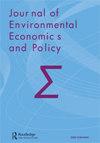能源援助是否降低了发展中国家的二氧化碳排放强度?
IF 1.2
Q3 ENVIRONMENTAL STUDIES
Journal of Environmental Economics and Policy
Pub Date : 2021-02-20
DOI:10.1080/21606544.2021.1882342
引用次数: 11
摘要
摘要能源援助是否有助于减少发展中国家的二氧化碳排放是一个悬而未决的问题。我们调查了经合组织发展援助委员会成员的能源援助是否有助于在1995-2014年期间降低64个受援国的二氧化碳排放强度。我们发现,一度滞后的能源援助——以一度滞后的GDP、绝对值或一度滞后的部门援助总额来衡量——在降低受援国随后的二氧化碳排放强度方面是有效的。重要的是,我们发现能源援助对受援国二氧化碳排放强度的影响千差万别——化石燃料丰富(贫穷)的国家从接受能源援助中受益最少(最多)。我们的研究结果指出,能源援助作为实现二氧化碳减排目标的政策工具有其优点,双边援助捐助方在提供能源援助时有必要考虑到受援国的化石燃料丰度。本文章由计算机程序翻译,如有差异,请以英文原文为准。
Does energy aid reduce CO2 emission intensities in developing countries?
ABSTRACT Whether energy aid contributes to the reduction of CO2 emissions in developing countries is an unresolved question. We investigate whether the OECD Development Assistance Committee members’ energy aid can help reduce CO2 emission intensities in 64 recipient countries over the period 1995–2014. We find that once lagged energy aid – when measured in terms of once lagged GDP, in absolute terms, or in terms of once lagged total sectoral aid – is effective in reducing the recipients’ subsequent CO2 emission intensities. Importantly, we find highly varied effects of energy aid on the recipients’ CO2 emission intensities – fossil fuel-rich (poor) countries stand to benefit least (most) from receiving energy aid. Our findings point towards the merit of energy aid as a policy tool in achieving the CO2 emission reduction goals and the necessity for bilateral aid donors to take into account the recipients’ fossil fuel abundance when making provisions for energy aid.
求助全文
通过发布文献求助,成功后即可免费获取论文全文。
去求助
来源期刊

Journal of Environmental Economics and Policy
ENVIRONMENTAL STUDIES-
CiteScore
4.70
自引率
7.70%
发文量
26
 求助内容:
求助内容: 应助结果提醒方式:
应助结果提醒方式:


